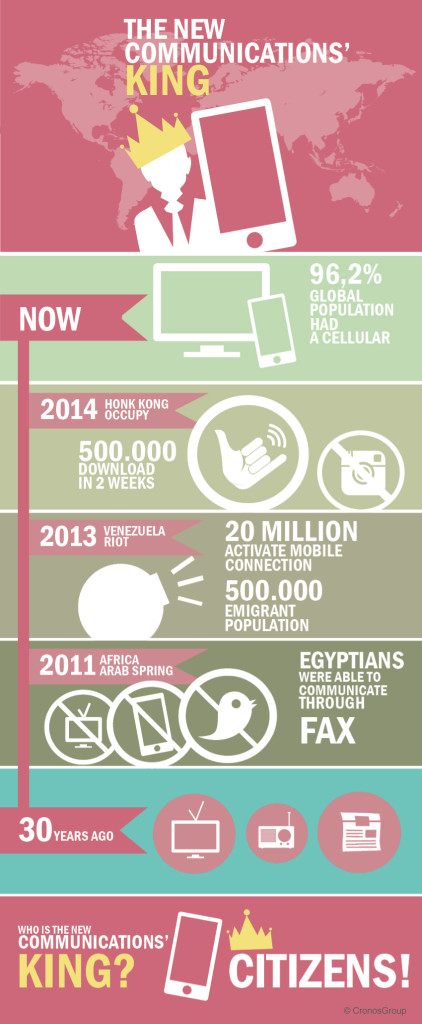During the last five years, Internet has mixed with the mobile phone and, as a result, smartphones have burst into our lives. According to the ITU, in 2013 the 96.2% of global population had a cellular and this year, the number of mobile phones have overtaken the number of worldwide population. More than the half of these lines correspond to the Asia-Pacific region.
Voice, messaging and video services are not only a multicultural service, there are an actual need; and, in conflicted times, these need shoot up significantly. Smartphones not only had served as a vehicle for the proximity and affective relations, but also have been used to organize social movements, revolutions and demonstrations. Several of them, enabled the change of governments and influenced the leaders.
The globalized social and information channels have taken a center role in recent revolutions, as it happened in North Africa with the “Arab Spring”. In the Egyptian case, Internet was in the public eye. Firstly, Twitter was censored by the government as it was considered as a revolutionist tool. Finally, Internet access was a completely cut off and they also suspend days later the service lines from mobile phones. Even the access to Al Jazeera TV was restricted. However, the Egyptians were able to communicate through outdated technologies, such as fax.
Another popular uprising, is the citizen movement against Venezuelan Hugo Chavez’s successor, Nicolas Maduro. First of all, we have to look into Venezuela demography. In this latin country, the emigrant population has grown more than 500.000 people due to the sociopolitical and economic situation. Venezuela is also the penultimate country in Latin America in terms of Internet speed. However, the number of cyber-activism have increased with more than 20 million active mobile connections, and, for example, they are using more Twitter than Brazilians or Spaniards. In spite of Maduro’s government has tried to block access to social networks, the population organized and spread several calls and messages in order to do demonstrations.
The most recent example of this kind of protest is in Hong Kong, where thousands of students have invaded the streets. They were, and still are, asking for full democracy and to establish a universal suffrage. As a result of a massive response and communication among them, cell towers get overloaded with traffic and Chinese authorities blocked Instagram, favored by Chinese dissidents because it was one of the few social networks not blocked in the country. However, protests used Firechat, a smartphone app which allows users to communicate without having data. The service registered, just in Hong Kong, more than 500.000 downloads, 10.2 million chat services and 1.6 million chatrooms in the first two weeks of the protest. The most relevant data from China’s Internet penetration is the users’ socio-economic profile. In this country, a large number of consumers are from poorer cities and have a lower level of education as well as income.
Internet has shaken up the telecommunications’ world. Some countries can think they are able to control social networks, as they did with the mass media some years ago. However, at the present time, the end user has a lot of techniques and resources to spread its own messages. Citizens will always look for alternatives and the market should adapt to these conditions and needs. Nowadays, citizens have become into the communications’ kings.





















